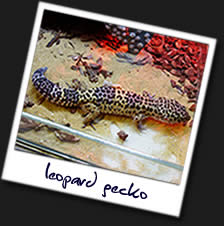www.reptiles-info.co.uk

Gecko Healthcare:
Leopard Geckos are a very tolerant species and there should be little concern for health related problems provided you keep an excellent environment and a well balanced diet for your gecko. However it is still possible for disease, illness or injuries to occur. Listed below are a list of ailments that can occur and if any of the problems persist it is advised that you visit your vet.
Tail Loss:
Often when geckos feel threatened or have their tail grabbed they will have an instinctive reaction to drop their tail as a defence mechanism. This helps to prevent any predators grabbing hold of the gecko and hopefully the predator concentrates on the tail whilst the gecko can make its escape. If your gecko loses its tail it is best to treatndhe wound with a good Iodine based treatment such as Tamodine. This will help to prevent the gecko becoming infected. It is also advised to keep your gecko separately on kitchen roll as the tail of the gecko is where fat is stored and without this the gecko can be under more stress, therefore a quiet environment can help the gecko to recover. The tail will eventually grow back, however it will not be in the same shape as the original and will usually be fatter and smaller.
Metabolic Bone Disease:
The symptoms of metabolic bone disease involve the limbs of the gecko becoming distorted, twisted or swollen this is due to the fact that the gecko has received a lack of calcium in its diet. In order to gain the calcium needed, the gecko will start to use the calcium in its bones. In order to help prevent metabolic bone disease you must always add the correct amount of calcium to the geckos live food. Recommended to add calcium/ vitamin mix 2-3 times per week for babies and only once per week for adults. Important! Too much calcium is also bad for your gecko and can lead to serious health problems as excess calcium builds up around the joints. If your gecko is suffering from Metabolic Bone disease I would advise you to visit your vet immediately. Click Here For More Information On Calcium and Gecko Feeding
Burns:
Skin damage and the burning of your geckos skin can be a common and some times fatal injury to your gecko. This is often caused by bulbs being too close and easily exposed within your geckos housing. This can be prevented by making sure your bulb is the correct distance away from the gecko. Installing a thermostat within the housing would also be an excellent way to help prevent overheating within the gecko's cage. Click Here For More Information On Correct Reptile Lighting
Mouth Infection:
In order to spot a form of mouth infection you should pay close attention to the mouth of the gecko and make sure there are no scratches or discharge from the mouth. If you can see any of these symptoms and your gecko has no appetite it would be advisable to consult your vet in order to resolve the infection.
Respiratory Infection:
If you notice that your gecko has difficult breathing by having its mouth gaping all of the time and bubbles coming out of the nostrils. It is most likely that you are dealing with a respiratory infection. This is due to the gecko being exposed to a cool air for a long periods. This can sometimes be easily resolved by raising the temperature of your geckos housing in order to create a warmer environment. If there is no improvement within a couple of days contact your vet for advice as he may need to treat with antibiotics.
Quarantine:
I advise that if you are bringing a new gecko into your existing vivarium or cage you should keep the new gecko separate and monitor the reptiles behavior to discover if it has any problems. A three week period should be safe enough in order to monitor your gecko and once this is complete you should be able to house the gecko into your existing housing, however I would advise against housing two males together as they will fight.
Gecko Pages






